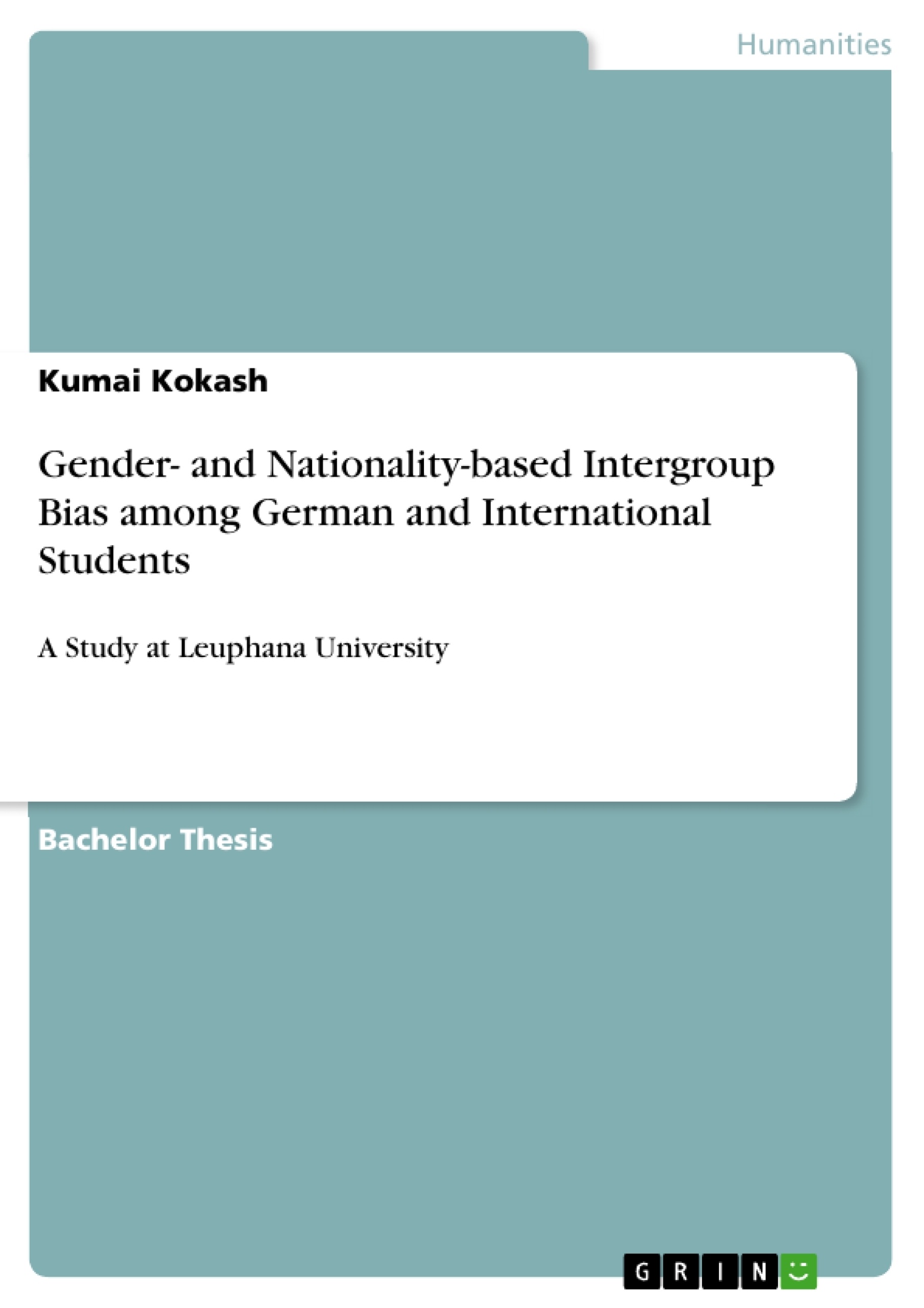In this thesis, it is investigated whether students at the Leuphana University express gender- and nationality-based Intergroup bias. Using an online experiment, it is employed a well-known allocation game in experimental economics (Ultimatum Game) on four different groups to examine whether subjects show ingroup favoring (outgroup disfavoring) behavior. It is found that subjects do not differentiate in their choices based on gender. However, it is observed a discriminatory behavior among international participants, as they offer German participants 46 cents less than they offer other international participants. Results from a logistic regression analysis also show that internationals are 26.4 percentage points more likely to discriminate against at least one outgroup. However, identification levels with the ingroup have no significant effects on subjects’ choices. Aside from that, other explanatory variables like age, work, and living situation all reveal insignificant effects on subjects’ decisions in the two phases of the game.
Inhaltsverzeichnis (Table of Contents)
- Introduction
- Literature Review
- Ultimatum Game
- Ingroup Favoritism and Outgroup Discrimination
- Explanatory Factors of Intergroup Bias
- Social Preferences, Fairness, Altruism, and Other-Regarding Behavior
- Gender and Nationality
- Social Distance
- Experimental Design and Procedure
- Experimental Design
- Groups
- Phase 1: Ultimatum Game as Player B
- Phase 2: Ultimatum Game as Player A
- Experimental Procedure
- Experimental Design
- Results
- Descriptive Statistics
- Hypothesis Testing
- Between-Groups Analysis
- Regression Analysis
- Discussion and Limitations
Zielsetzung und Themenschwerpunkte (Objectives and Key Themes)
This thesis investigates the presence of gender- and nationality-based intergroup bias among students at Leuphana University. The research aims to understand whether participants exhibit ingroup favoring or outgroup disfavoring behavior in an economic allocation game (Ultimatum Game) involving different groups.
- Intergroup Bias: Analyzing ingroup favoring and outgroup discrimination based on gender and nationality.
- Ultimatum Game: Employing a well-established game in experimental economics to study decision-making in intergroup interactions.
- Group Membership: Examining how students' membership in different groups, defined by gender and nationality, influences their behavior and choices.
- Explanatory Factors: Investigating the role of social preferences, fairness, altruism, and other-regarding behavior in shaping intergroup bias.
- Social Distance: Exploring the potential impact of perceived social distance between groups on the observed intergroup bias.
Zusammenfassung der Kapitel (Chapter Summaries)
- Introduction: Introduces the concept of intergroup bias and its significance in understanding human behavior, particularly in the context of decision-making processes. The chapter highlights the importance of studying intergroup interactions and the potential for conflict arising from these interactions.
- Literature Review: Provides a comprehensive overview of existing research on the Ultimatum Game, ingroup favoritism, outgroup discrimination, and the factors that contribute to intergroup bias. It delves into social preferences, fairness, and other-regarding behavior, as well as the potential impact of gender and nationality on intergroup bias.
- Experimental Design and Procedure: Outlines the detailed methodology employed in the research, including the specific groups involved, the phases of the Ultimatum Game, and the procedures for data collection and analysis.
- Results: Presents the findings of the experiment, including descriptive statistics and hypothesis testing results. It analyzes the data to determine the presence or absence of intergroup bias, the specific patterns observed, and the significance of various explanatory factors.
Schlüsselwörter (Keywords)
This thesis focuses on intergroup bias, specifically examining gender- and nationality-based discrimination. It explores the Ultimatum Game as a tool for studying decision-making in intergroup interactions and investigates the influence of social preferences, fairness, and other-regarding behavior on participants' choices. The research examines the potential role of social distance in shaping intergroup bias and utilizes statistical analysis to identify significant effects and patterns.
Frequently Asked Questions
What is the main focus of this research?
The thesis investigates whether students at Leuphana University exhibit gender- and nationality-based intergroup bias using experimental economics.
How was the intergroup bias measured?
Bias was measured using an online "Ultimatum Game," where participants allocate money to examine ingroup favoring or outgroup disfavoring behavior.
Were there significant findings regarding gender bias?
No, the study found that subjects did not differentiate in their choices based on gender.
What were the results regarding nationality?
International participants offered German participants 46 cents less than they offered other international participants, indicating a discriminatory behavior.
Did age or work situation affect the decisions?
Analysis showed that variables like age, work, and living situation had insignificant effects on the subjects' decisions during the game.
- Citation du texte
- Kumai Kokash (Auteur), 2020, Gender- and Nationality-based Intergroup Bias among German and International Students, Munich, GRIN Verlag, https://www.grin.com/document/955972



